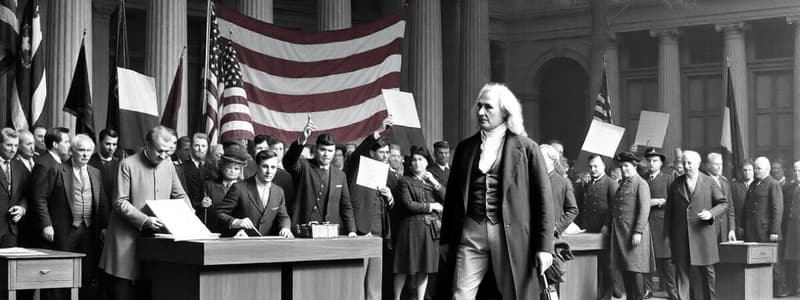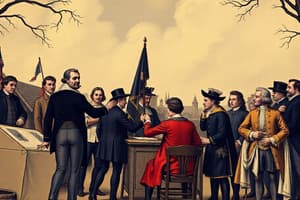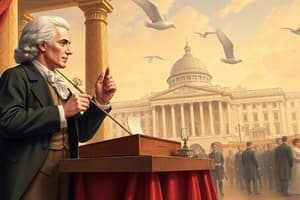Podcast
Questions and Answers
What motivated Napoleon to sell Louisiana, and what role did Jefferson play in this transaction?
What motivated Napoleon to sell Louisiana, and what role did Jefferson play in this transaction?
Napoleon sought to sell Louisiana due to his negative view of colonies after the Haitian revolution and the need for money, while Jefferson aimed to secure New Orleans for American farmers.
Discuss the constitutional concerns surrounding Jefferson's purchase of Louisiana.
Discuss the constitutional concerns surrounding Jefferson's purchase of Louisiana.
The purchase was seen as arguably unconstitutional because the Constitution does not explicitly grant the president the authority to acquire land.
What was the primary goal of the Embargo Act, and why did it ultimately fail?
What was the primary goal of the Embargo Act, and why did it ultimately fail?
The primary goal of the Embargo Act was to punish Britain for impressing American sailors, but it failed because Britain was preoccupied with war and it severely damaged the American economy.
Analyze how Jefferson's policies contradicted his vision of government and society.
Analyze how Jefferson's policies contradicted his vision of government and society.
What are the dual aspects of Jefferson's legacy, and how do they illustrate his complexity as a historical figure?
What are the dual aspects of Jefferson's legacy, and how do they illustrate his complexity as a historical figure?
What was the outcome of the election between Thomas Jefferson and John Adams, and what was significant about this election?
What was the outcome of the election between Thomas Jefferson and John Adams, and what was significant about this election?
How did the 12th Amendment impact the electoral college, and what was still a limitation of this system?
How did the 12th Amendment impact the electoral college, and what was still a limitation of this system?
Discuss the contradiction between Jefferson's beliefs in liberty and his actions regarding slavery.
Discuss the contradiction between Jefferson's beliefs in liberty and his actions regarding slavery.
What were the goals of Gabriel's Rebellion, and what were the consequences of the failed uprising?
What were the goals of Gabriel's Rebellion, and what were the consequences of the failed uprising?
Explain the significance of the Louisiana Purchase during Jefferson's presidency.
Explain the significance of the Louisiana Purchase during Jefferson's presidency.
Flashcards
1800 Presidential Election Outcome
1800 Presidential Election Outcome
The election of 1800 resulted in a tie in the Electoral College between Thomas Jefferson and Aaron Burr, ultimately decided by the House of Representatives.
Jefferson's Presidency Contradiction
Jefferson's Presidency Contradiction
Thomas Jefferson, a champion of liberty and democracy for some, simultaneously owned enslaved people and held racist beliefs about Black people.
Gabriel's Rebellion
Gabriel's Rebellion
A planned slave uprising in Virginia led by Gabriel in 1800. It was foiled and resulted in increased restrictions on enslaved people's lives.
Louisiana Purchase
Louisiana Purchase
Signup and view all the flashcards
Electoral College Tiebreaker
Electoral College Tiebreaker
Signup and view all the flashcards
Napoleon's Motivation
Napoleon's Motivation
Signup and view all the flashcards
Jefferson's Goal
Jefferson's Goal
Signup and view all the flashcards
Constitutional Debate
Constitutional Debate
Signup and view all the flashcards
Embargo Act's Goal
Embargo Act's Goal
Signup and view all the flashcards
Embargo Act's Outcome
Embargo Act's Outcome
Signup and view all the flashcards
Study Notes
The 1800 U.S. Presidential Election
- Thomas Jefferson ran against John Adams in the first election with candidates from both parties campaigning.
- The Federalist's strategy of using "Vote for Adams, because he's smarter than you" failed.
- Both parties coordinated their electoral strategies to prevent the Vice President from receiving more votes than the President.
- A Republican elector forgot their plan, resulting in a tie between Jefferson and Burr despite efforts to avoid this outcome.
- The election went to the House of Representatives, where it took 36 votes and Alexander Hamilton’s support for Jefferson to be chosen as President.
- Jefferson’s victory showed a shift in American values towards a more democratic political approach, giving ordinary people the freedom to express their opinions.
- The 12th Amendment simplified the electoral college system, but it still wasn’t as simple as one-person, one-vote.
Jefferson’s Presidency
- Jefferson’s slogan was "Jefferson and Liberty,” but freedom was limited for many as only a small fraction of white men could vote, and there was no freedom for enslaved people.
- Jefferson was a racist who believed Black people were inferior to white people and Native Americans. He believed this even though he had children with one of his enslaved people.
- George Washington freed his slaves after his wife’s death, because his wife didn’t want to live in a house with only people who were waiting for her to die.
- With a few exceptions, Jefferson didn’t free his slaves at his death and sold enslaved people to maintain his luxurious lifestyle.
- This raises the philosophical question of whether one’s negative traits lessen their accomplishments, as with Richard Nixon and the creation of the EPA.
Gabriel’s Rebellion
- Gabriel, a blacksmith from Richmond, Virginia, planned an uprising against the slave system.
- Gabriel hoped to capture the Virginia Capital, kill some citizens, and hold others hostage until slavery was abolished.
- The plot was uncovered, and Gabriel and 25 others were hanged.
- After the uprising, Virginia tightened slavery laws, making it illegal for enslaved people to meet in groups on Sunday without white supervision and more difficult for white people to free their enslaved people legally.
The Louisiana Purchase
- Jefferson almost doubled the size of the United States by purchasing the Louisiana Territory from Napoleon for 15million,equivalentto15 million, equivalent to 15million,equivalentto250 million today.
- Napoleon wanted to sell because the Haitian revolution had soured his view of colonies and he needed money.
- Jefferson was seeking to buy New Orleans because the area was a distribution hub for farmers in the West.
- The purchase was arguably unconstitutional because the Constitution doesn't explicitly grant presidents the authority to buy land.
- Lewis and Clark were sent to explore the land after the purchase, ultimately reaching the Pacific Ocean.
The Embargo Act
- Jefferson tried to implement the Embargo Act as a way to punish Britain for impressing (kidnapping) American sailors into the British Navy and for their blockade of France, with whom they were at war.
- Jefferson’s ideal was to promote free trade among nations, but his solution was to block all American ships from entering foreign ports.
- The theory behind the policy was that Britain relied on American raw goods like lumber and cotton, so they would stop impressing American sailors and their blockade if American goods were no longer available.
- However, the act largely failed because Britain and France were too occupied with war to be fazed by the embargo.
- The act also damaged the American economy, reducing exports by 80%.
- It unintentionally strengthened the American manufacturing industry because the country could no longer import manufactured goods from Europe.
- The Embargo Act was ultimately a huge failure because it failed to achieve its goals but also caused tremendous damage.
- The Embargo Act was a massive use of government power and also restricted the freedom of American citizens.
- The problems the Embargo Act aimed to address persisted and ultimately contributed to the War of 1812, the first declared war in U.S. history.
Jefferson’s Legacy
- Jefferson is both celebrated and criticized in American history.
- Although the Declaration of Independence, which Jefferson drafted, laid out heroic ideas for the founding of the United States, it also embodies some of the nation’s failures.
- Jefferson’s presidency was a complex period with both positive and negative aspects.
- He advocated for a small government but expanded the government’s power more than Washington or Adams.
- He envisioned an agrarian republic, but his policies led to increased manufacturing.
- He wanted to promote freedom but owned enslaved people and stole land from Native Americans.
- Jefferson's personal and political journeys were a blend of positive and negative elements, making him a complex figure worth studying as a president.
Studying That Suits You
Use AI to generate personalized quizzes and flashcards to suit your learning preferences.




